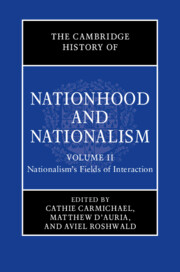Book contents
- The Cambridge History of Nationhood and Nationalism
- The Cambridge History of Nationhood and Nationalism
- The Cambridge History of Nationhood and Nationalism
- Copyright page
- Contents
- Figures
- Tables
- Contributors
- Part I Imperial and Postcolonial Settings
- Part II Transnational and Religious Missions and Identities
- Part III Intersections: National(ist) Synergies and Tensions with Other Social, Economic, Political, and Cultural Categories, Identities, and Practices
- 21 Self-Determination and National Sovereignty
- 22 Citizenship and Nationhood: From Antiquity to Gaia Citizenship
- 23 Religion and Nationhood
- 24 Nationalism and Capitalism
- 25 Economic Nationalism in an Imperial Age, 1846–1946
- 26 National Identity and the Idea of Race in the Dinaric Region
- 27 Nationalism, Ethnic Cleansing, and Genocide: A View from Below
- 28 Warfare, Nation Formation, and the Legitimacy of States: An Ethnosymbolic Perspective
- 29 Nationalism, Terrorism, and the State: Historical Perspectives
- 30 Negotiating National Identity through Tourism in Colonial South Asia and Beyond
- 31 Gendered Nations and Institutions
- 32 Historiographies and Commemorative Practices
- 33 Nation and Literature
- 34 Foodways and Nationhood
- 35 The Dynamics of National Music: Opera and Classical Music in the Nineteenth and Early Twentieth Century
- 36 Media and Nationalism: Europe and the USA, 1500–2000
- Conclusion to Part III
- Index
- References
27 - Nationalism, Ethnic Cleansing, and Genocide: A View from Below
from Part III - Intersections: National(ist) Synergies and Tensions with Other Social, Economic, Political, and Cultural Categories, Identities, and Practices
Published online by Cambridge University Press: 08 November 2023
- The Cambridge History of Nationhood and Nationalism
- The Cambridge History of Nationhood and Nationalism
- The Cambridge History of Nationhood and Nationalism
- Copyright page
- Contents
- Figures
- Tables
- Contributors
- Part I Imperial and Postcolonial Settings
- Part II Transnational and Religious Missions and Identities
- Part III Intersections: National(ist) Synergies and Tensions with Other Social, Economic, Political, and Cultural Categories, Identities, and Practices
- 21 Self-Determination and National Sovereignty
- 22 Citizenship and Nationhood: From Antiquity to Gaia Citizenship
- 23 Religion and Nationhood
- 24 Nationalism and Capitalism
- 25 Economic Nationalism in an Imperial Age, 1846–1946
- 26 National Identity and the Idea of Race in the Dinaric Region
- 27 Nationalism, Ethnic Cleansing, and Genocide: A View from Below
- 28 Warfare, Nation Formation, and the Legitimacy of States: An Ethnosymbolic Perspective
- 29 Nationalism, Terrorism, and the State: Historical Perspectives
- 30 Negotiating National Identity through Tourism in Colonial South Asia and Beyond
- 31 Gendered Nations and Institutions
- 32 Historiographies and Commemorative Practices
- 33 Nation and Literature
- 34 Foodways and Nationhood
- 35 The Dynamics of National Music: Opera and Classical Music in the Nineteenth and Early Twentieth Century
- 36 Media and Nationalism: Europe and the USA, 1500–2000
- Conclusion to Part III
- Index
- References
Summary
This chapter examines the relationship between nationalism, ethnic cleansing, and genocide from the perspective of Eastern Galicia, a multiethnic and multireligious region populated for 400 years by Poles, Ruthenians, and Jews, which was transformed by the advent of nationalism from a society of never-harmonious but rarely violent interethnic coexistence into one of extreme violence. Special attention is given to the town and district of Buczacz as representative of what is now known as western Ukraine. In writing this chapter, I have drawn on the research conducted for my recent study, Anatomy of a Genocide: The Life and Death of a Town Called Buczacz.1 But while the book provides a heavily documented narrative of events in this locality, it largely refrains from explicitly discussing the theoretical and methodological concepts that undergird it.
Keywords
- Type
- Chapter
- Information
- The Cambridge History of Nationhood and Nationalism , pp. 578 - 596Publisher: Cambridge University PressPrint publication year: 2023



